For many patients, deciding in favor of stem cell therapy can be overwhelming. This is understandable, given that it’s a rapidly evolving field of medicine that has yet to receive FDA approval, and there is a lot of information (and misinformation) circulating.
Rather than obscuring or overhyping these treatments, this article aims to address safety concerns and potential side effects candidly and directly.
The Main Risks of Stem Cell Treatments
The Food and Drug Administration (FDA) emphasized the primary concerns about the risks of mesenchymal stem cell (MSC) treatments:
| Possible adverse reactions to stem cell therapy | How FDA considers it |
| Immune rejection | The immune system may recognize the introduced stem cells as foreign and attack them, potentially resulting in inflammation or other adverse reactions. This is similar to what can happen during an organ transplant. |
| Possibility of stimulating tumor growth | Theoretical risk that MSCs could unintentionally promote the growth of existing tumors or cause new ones. |
| Site reactions | Patients might experience localized reactions at the site where the stem cells are injected or infused. This could include pain, swelling, redness, or infection. These reactions vary in severity and duration. |
| Overdose or failure to function as intended | There’s a possibility of receiving too high a dose of stem cells, or the cells may not function as expected. This could lead to adverse reactions or a lack of therapeutic benefits. |
Let us take a closer look at each of these concerns to see if and when patients may have adverse reactions to stem cell therapy.
Concern #1: Is It Possible That My Body Rejects Stem Cells?
Stem cell effectiveness and safety depend on the types of stem cells used. Uncertainty about stem cell types and their mechanisms of action has frequently led to the widespread belief that stem cell therapy is dangerous.
The most common side effects are associated with hematopoietic stem cell therapy (HSCT), or stem cell transplantation.
HSCs are a type of stem cell found in the bone marrow that can give rise to all types of blood cells in the body. They are crucial for the production of red blood cells, white blood cells, and platelets. Because of this, HSCT has been employed in the treatment of diseases relating to blood and bone marrow, such as leukemia, autoimmune diseases, and specific genetic disorders.
However, HSCs have a high expression of the human leukocyte antigens (HLA) on their surface. HLAs are proteins that help the immune system distinguish between its own cells and foreign substances.
This means that when HSCs from a donor are transplanted into a recipient during a hematopoietic stem cell transplant (HSCT), they begin to attack the patient’s cells.
To avoid negative outcomes, it is necessary to match the HLA of the donor and recipient as closely as possible. In addition, patients often receive medicines that lower their immune system’s activity.
Why It Won’t Happen to You at Swiss Medica
Mesenchymal stem cells have a low expression of HLA, making them less likely to trigger an immune response and eliminating the need for donor matching.
MSCs, along with other biomedical products and additional therapies, such as IMR, have several mechanisms that minimize rejection:
| Stem Cell Effectiveness and Safety | How does MSC achieve it? |
| Low expression of major histocompatibility complex (MHC) molecules | This mechanism makes MSCs less recognizable as foreign |
| Immunomodulation | MSCs can suppress the immune system, further reducing rejection. Stem cells from certain sources, like umbilical cords, have even stronger immunomodulatory properties. |
| Targeted migration | MSCs immediately move to inflamed areas where they can exert therapeutic effects |
MSCs also have a high potential for tissue regeneration and differentiation, which can help treat a variety of diseases.
However, safety remains a top priority for researchers and regulators.
Interested in learning more about Mesenchymal stem cells?
You can find more details in our dedicated article.
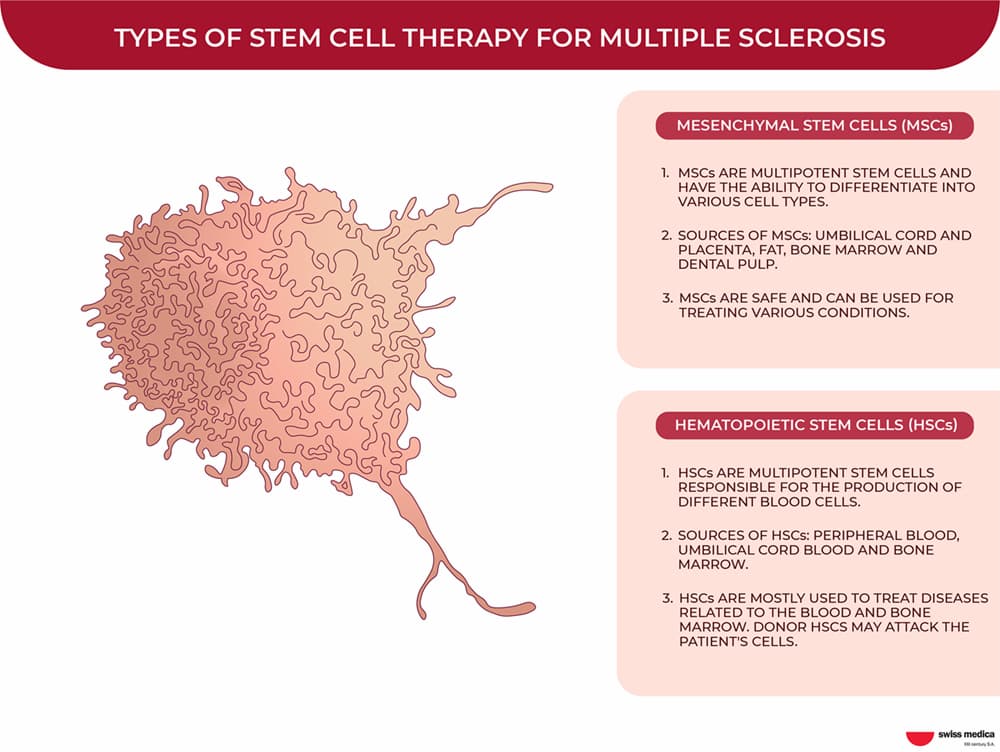
Learn more about the diverse cells and biomedical products used in our treatments.
Find out hereConcern #2: Can Stem Cells Trigger Cancer?
A major concern with stem cell therapy is the possibility of tumor formation. This risk comes from certain types of stem cells that can divide too much or change into abnormal cells, like embryonic or fetal stem cells.
At Swiss Medica, we only use mesenchymal stem cells because they’re safer, and people’s bodies handle them well. Multiple clinical trials demonstrated that no malignancies occurred after application of MSCs.
Furthermore, studies have demonstrated that MSCs may also inhibit tumor growth in certain cases, such as breast cancer, Kaposi’s sarcoma, hepatoma, and melanoma models.
- When MSCs and tumor cells mix, it causes more white blood cells to go to the area, like monocytes, granulocytes, and T-lymphocytes.
- This increase in immune cells allows them to communicate with nearby tissues.
- The immune cells and inflamed tissues produce certain chemicals that attract more active lymphocytes, which help boost the body’s ability to fight cancer.
However, this method seems to have both benefits and risks and requires cautious and precise implementation. The mixed findings about how mesenchymal stem cells affect tumor growth could be due to experimental factors, like where the cells come from, the route of cell administration, and the type of tumor studied.
Get a free online consultation
Your safety is our top priority. Our medical advisors are here to provide clear information on potential adverse effects of stem cell therapy. Fill out the form for a free consultation and get your questions answered.

Medical Advisor, Swiss Medica doctor
Concern #3: How High Is the Risk of a Potential Infection?
One of the concerns with stem cell effectiveness and safety is the risk of contracting hepatitis, HIV, and other viruses and bacteria from donor cells. To mitigate this risk, it is necessary to:
- Screen the donor’s materials.
- Check the cells before preparation in the laboratory.
- Ensure a safe and clean environment in the laboratory.
- Monitor and examine cells during cultivation and prior to injection.
Since 2011, Swiss Medica has maintained a contamination-free environment, with no infection complications. We ensure the highest quality of stem cells and bioproducts through the following measures.
Exceptional standards of our lab
We follow all cell bank standard operating procedures and keep the facility clean to EU GMP Grade A standards. Regular internal and external audits ensure strict adherence to the highest quality and sterility standards.
Full control over stem cells and other bioproducts
Our donors undergo thorough medical screenings to confirm their health status and the absence of infections. This includes sourcing donor cells from authorized banks and sterile collection of patient-specific cells.
Before use, our stem cells go through rigorous testing to ensure purity, viability, and sterility. This includes checks for bacterial, fungal, and viral contamination, as well as genetic testing to verify their identity and function.
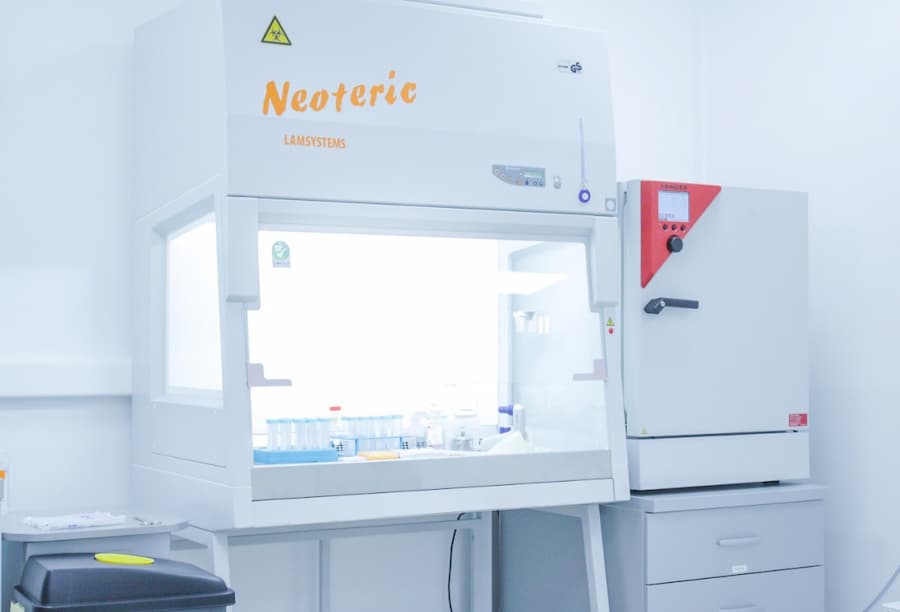
To learn more about the stem cell production process in our lab, please refer to this article.
Read nowConcern #4: Can I Have an Overdose?
Stem cell safety is confirmed by clinical trials. However, it’s crucial to note that excessive doses can be harmful. Potential risks include:
- Vascular overload,
- Blood clots,
- Lung retention, leading to respiratory issues.
To prioritize safety, we tailor the dosage for each patient individually, never surpassing the maximum safe limit.
Learn in detail how the stem cell therapy process works at our hospital, from cell collection to post-recovery.
View hereConcern #5: If It’s Safe, Why Wouldn’t the FDA Approve MSC Transplants?
The FDA has approved several stem cell-based products. Thanks to the 21st Century Cures Act, the FDA established clear guidelines for which stem-cell treatments it oversees in 2017. This includes bone marrow transplantation to treat certain cancers, as well as blood and immune system disorders.
Still, the journey from stem cell science to medicine is long and costly. While rigorous FDA evaluation is crucial for safety and efficacy, some clinics have undermined genuine research by offering unproven therapies, diverting patients from legitimate studies. These clinics argue that FDA regulations, which require costly toxicology and animal studies, are excessively burdensome and force them down an impractical and unethical drug development path.
As you can see, it’s a work in progress.
What Are the Real Adverse Effects of Stem Cells?
Possible side effects of the treatment include the following:
- Short-term fever,
- Headaches,
- Malaise,
- Aches and pains in muscles,
- Nausea in children.
In our medical practice, we find that these occurrences are extremely rare. The majority of these symptoms last only a few hours following the injection. Pain relievers or rest after the surgery may help alleviate the discomfort.
Hear from other patients and discover their personal experiences with our treatments.
See reviewsHow Does Swiss Medica Prevent Side Effects Risks?
1. By conducting thorough preparation and investigation into the patient’s history
We conclude detailed consultations, along with surveys and tests, to ensure that stem cell therapy is effective for each patient. We may advise against receiving stem cell therapy because of certain conditions.
2. By ensuring the safety of stem cell products
Our stem cells, sourced from umbilical cords and placentas, are carefully collected in a sterile environment to prevent contamination. These tissues, typically discarded after birth, are ethically harvested without invasive procedures and closely monitored and checked for each stage until successful administration.
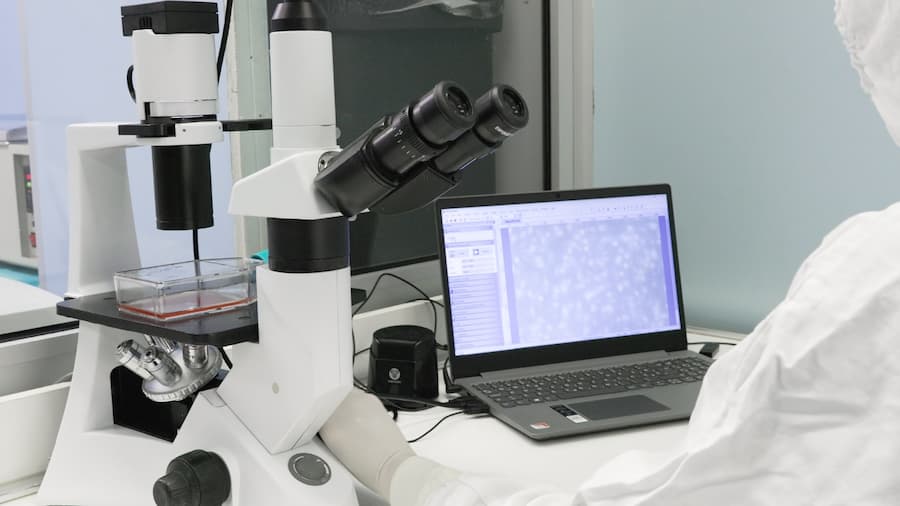
Get a behind-the-scenes look at our lab and the production process with our video in the article.
Explore now3. By having our laboratory located in the same facility as the clinic
Our on-site cell laboratory, with facilities for flow cytometry and cryopreservation for long-term storage of patients’ stem cells, allows us to handle the entire stem cell therapy process in-house. It also ensures tight quality control and coordination throughout the stem cell therapy process.
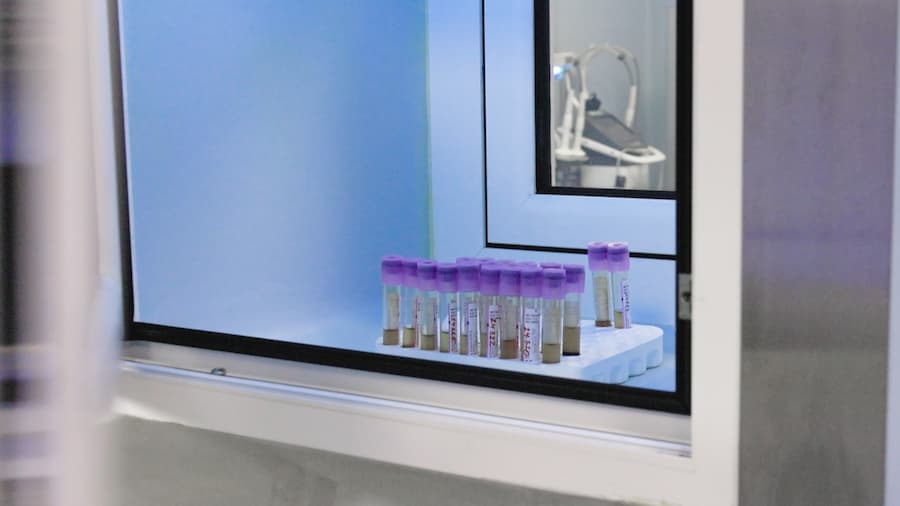
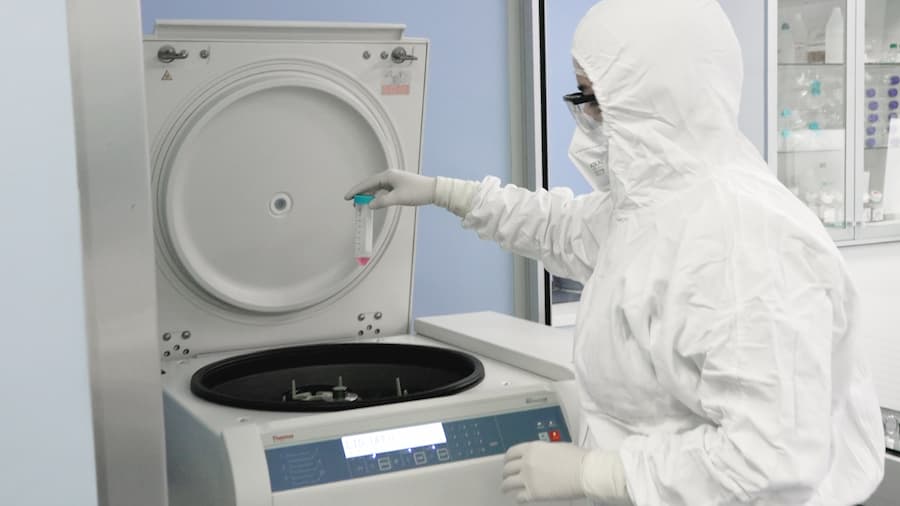
4. By hiring only highly skilled professionals
Our staff is extensively trained in stem cell therapy procedures and adheres to strict protocols to minimize any potential risks, including infections. They possess the expertise necessary to calculate precise dosages of stem cell products and execute treatments with care.

For more details about our clinic, including its location and the treatments we offer, visit our article.
Read nowWhat Scientific Studies Have to Say About Stem Cells’ Safety
To ensure transparency, we will provide a thorough overview of the official information derived from scientific studies confirming stem cell safety, along with links for readers interested in delving deeper into the topic.
Safety of stem cell therapy is studied through wide-ranging analyses and specific trial reports. These studies often compare the number of side effects in patients who receive MSC treatment to those who receive a fake treatment or no treatment at all.
What are the most frequent side effects?
Two big analyses, one in 2012 by Manoj M. Lalu and another in 2021 by Yang Wang, looked at research from 2004 to 2021. The 2012 study reviewed 36 trials with 1005 patients in 14 countries, while the 2021 study included 62 trials with 3546 patients covering over 20 health conditions.
Common side effects discovered in studies:
- Temporary fever,
- Mild anemia,
- Site skin reactions,
- Constipation,
- Fatigue,
- Sleep disturbances.
Some uncommon but serious adverse effects of stem cell therapy, like metabolism issues, infections, death, heart rhythm problems, and disorders of the nervous system and blood vessels, were not affected by MSC treatment. There wasn’t a big difference in how often these side effects happened between patients who got MSC treatment and those who got a placebo.
Since most of the side effects seen in stem cell treatments are mild, it confirms the safety of stem cell therapy.
Other interesting findings from the studies:
| Only 8% of people have side reactions. |
| The heart condition is still being investigated. | There wasn’t much difference in heart issues between those who got MSC treatment and those who didn’t. |
| Gastrointestinal issues are also being investigated. | Gastrointestinal diseases didn’t show a big difference between MSC-treated and non-treated patients. Only one study found bilirubin elevation in 11% of patients. Bilirubin is a yellowish pigment produced during the breakdown of red blood cells. Normally, it is processed by the liver and excreted from the body through bile. |
| Lung issues demonstrated good improvements. | The rate of lung issues ranged from 3% to 13%, including mild problems like trouble breathing and more severe conditions like bronchiolitis obliterans, as well as significant improvements in lung function. |
MSC Treatment Safety in Disease-Specific Trials
Trials focusing on specific conditions also confirmed mesenchymal stem cells safety.
Autoimmune conditions: systemic sclerosis
In 9 clinical trials involving 133 participants with systemic sclerosis, most reported side effects were mild and related to the procedure:
- Local pain,
- Swelling,
- Redness, which usually improves within a week,
- One case had a moderate reaction (skin infection), but no severe adverse effects were reported.
Infectious issues: COVID-19
In 13 clinical studies of COVID-19 involving 557 patients, no severe adverse effects related to MSCs were reported. Rare, non-severe effects included mild fever, which resolved on its own.
Cardiovascular conditions: heart failure
In studies involving a large number of patients with heart failure (823-1255), researchers didn’t find a significant difference in severe side effects between those who received MSC treatment and those who received a placebo.
However, the rate of death was noticeably lower among patients who received MSC treatment. In one review, out of 1255 patients, only four adverse events were suspected to be related to the treatment:
- Local hematoma,
- Temporary bundle branch block (the bundle branches are part of the electrical conduction system of the heart),
- Pericardial effusion (it refers to the accumulation of fluid in the pericardial sac that surrounds the heart and helps protect it),
- Pulmonary edema (fluid buildup in the lungs while a medical procedure is being performed) during the procedure.
Neurological conditions
There was a big review of studies about neurological conditions, involving a total of 1044 patients.
Spinal cord injury
The majority had mild issues like fever and headaches. Some severe effects included:
- One case of seizures needing hospital care;
- Two cases of meningitis after injections into the spine.
But these problems got better quickly. One patient died after getting cells implanted directly into the cord.
Multiple sclerosis
Seven trials from 2016 to 2022 didn’t report any serious side effects from MSC treatment. Another review covering six trials with 86 patients, including one study that followed patients for 10 years, also didn’t find any serious issues related to MSC treatment.
Autism
With 325 patients, there were 16 minor side effects like low fever, headaches, and fatigue.

Conclusion: Stem Cell Therapy is Safe With Science-Based Treatment Protocols
As studies have shown, most side effects were either absent or mild, once again proving the safety and efficacy of stem cell therapy. However, to ensure stem cell injections safety, it’s important for doctors to understand the risks associated with them.
Swiss Medica’s medical staff addresses these challenges by staying current with research, adhering to strict safety protocols, and communicating openly with patients. Here, we maximize the incredible potential of regenerative medicine while keeping patients safe and healthy.
Contact us
Make informed decisions about your health. Swiss Medica is committed to providing you with the safest treatment options available. Fill out the form to schedule a free consultation to learn more.

Medical Advisor, Swiss Medica doctor
Ready to Explore More?
Discover the full potential of stem cells and dive into additional articles.
List of References
Wang, Y., Yi, H. & Song, Y. The safety of MSC therapy over the past 15 years: a meta-analysis. Stem Cell Res Ther 12, 545 (2021). https://doi.org/10.1186/s13287-021-02609-x
Cui, J., Jin, L., Ding, M. et al. Efficacy and safety of mesenchymal stem cells in the treatment of systemic sclerosis: a systematic review and meta-analysis. Stem Cell Res Ther 13, 118 (2022). https://doi.org/10.1186/s13287-022-02786-3
Blum B, Benvenisty N. The tumorigenicity of human embryonic stem cells. Adv Cancer Res. 2008;100:133-58. doi.org/10.1016/S0065-230X(08)00005-5
Xuan, X., Tian, C., Zhao, M. et al. Mesenchymal stem cells in cancer progression and anticancer therapeutic resistance. Cancer Cell Int 21, 595 (2021). https://doi.org/10.1186/s12935-021-02300-4
Musiał-Wysocka A, Kot M, Majka M. The Pros and Cons of Mesenchymal Stem Cell-Based Therapies. Cell Transplantation. 2019;28(7):801-812. doi.org/10.1177/0963689719837897
Lee HY, Hong IS. Double-edged sword of mesenchymal stem cells: Cancer-promoting versus therapeutic potential. Cancer Sci. 2017 Oct;108(10):1939-1946. doi.org/10.1111/cas.13334
Aravindhan, S., Ejam, S.S., Lafta, M.H. et al. Mesenchymal stem cells and cancer therapy: insights into targeting the tumour vasculature. Cancer Cell Int 21, 158 (2021). https://doi.org/10.1186/s12935-021-01836-9
Fisher SA, Brunskill SJ, Doree C, Mathur A, Taggart DP, Martin‐Rendon E. Stem cell therapy for chronic ischaemic heart disease and congestive heart failure. Cochrane Database of Systematic Reviews 2014, Issue 4. Art. No.: CD007888. doi.org/10.1002/14651858.CD007888.pub2
Christopher Elnan Kvistad1, Torbjrn KrkenesTorbjørn Kråkenes, Cecilie GjerdeCecilie Gjerde, Kamal MustafaKamal Mustafa, Tiina Rekand, Lars Bø. Safety and Clinical Efficacy of Mesenchymal Stem Cell Treatment in Traumatic Spinal Cord Injury, Multiple Sclerosis and Ischemic Stroke – A Systematic Review and Meta-Analysis. https://doi.org/10.3389/fneur.2022.891514
Islam MA, Alam SS, Kundu S, Ahmed S, Sultana S, Patar A, Hossan T. Mesenchymal Stem Cell Therapy in Multiple Sclerosis: A Systematic Review and Meta-Analysis. J Clin Med. 2023 Sep 30;12(19):6311. doi.org/10.3390/jcm12196311
Paprocka J, Kaminiów K, Kozak S, Sztuba K, Emich-Widera E. Stem Cell Therapies for Cerebral Palsy and Autism Spectrum Disorder-A Systematic Review. Brain Sci. 2021 Dec 3;11(12):1606. doi.org/10.3390/brainsci11121606